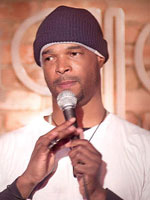Death: May 9, 2004
BlueMeter: Tame
Works
Records
| 1994 | Comic Relief VI This album is a compilation, featuring multiple comics. |
|
| 1961 | The Best Of Alan King | |
| 1960 | Alan King in Suburbia |
Specials (and other video)
| 2000 | Let Me In, I Hear Laughter: A Salute to the Friars Club | |
| 1994 | Comic Relief VI Benefit show that features multiple comics. |
|
| 1988 | Inside the Comedy Mind | |
| 1982 | The 7th Annual Young Comedians Show |
Books (by and about)
| 2002 | Alan King's Great Jewish Joke Book | |
| 1996 | Name-Dropping: The Life and Lies of Alan King Co-authored by Chris Chase |
|
| 1985 | Is Salami and Eggs Better Than Sex? Memoirs of a Happy Eater Co-written with Mimi Sheraton |
|
| 1964 | Help! I'm a Prisoner in a Chinese Bakery with Jack Shurman |
|
| 1962 | Anybody Who Owns His Own Home Deserves It with Kathryn Ryan |
Biography
It's simple, said Alan King: "Everything I talk about touches a chord in the audience, that's why they laugh…what happens to me makes people laugh. It's a funny world we live in. If we didn't laugh about it we'd cry."
What always happened to King was aggravation—the kind that makes the average family man go through the day with a headache and an ulcer, snarling and sneering over: the family, the plumber, the carpenter, the decorater, the house, the doctor, the lawyer, bad phone service and lost airline luggage.
Barely concealing his irritation, his eyes glaring, his mouth half flattened in silent rage but twisting at the corners in disgust, King's rage was never out of control like a Don Rickles. More hilariously, he simmered, slow burned, and in controlled bursts of enunciated fury gathered steam and "let em have it."
Always aggressive, King grew up in tough neighborhoods on the Lower East Side of Manhattan and in Brooklyn. He had seven brothers and a sister. There were many mouths to feed and not enough money: "I don't honestly think that an absence of money is funny. We went on relief when I was three years old and for nine years my father couldnt get a job in his trade." King began working after he left Boys High School in Brooklyn: "I wasn't a drop out…I was a throw out. I majored in truancy and class-cutting."
He was a drummer and a boxer before becoming a comic in the Catskills. He was fired from one of his first jobs, at the Hotel Gradus, when he opened with: "When you work for Gradus, you work for gratis!"
King became a regular on the club circuit, reaching his first peak opening for Judy Garland at The Palace on Broadway in 1956. Though a contemporary of Lenny Bruce, and a man whose comedy was firmly based in aggression, King chose a different path, working classier clubs, talking about suburbia, reaching a middle class audience. Hip comedy critics didn't see much heroism in King's "Ed Sullivan Show" appearances of the 60's as he took on gardeners and stewardesses, but he was reacting to what was around him—and what was on the minds of the average guy who didn't read the newspaper as thoroughly as Mort Sahl, and who considered the phone company more of a threat than Russia.
Wearing a vested suit, smoking a cigar, he was the guy who had worked hard for the good life, only to find that it wasn't so good. Take suburban schooling: "We live directly across the street from a public school, and my boys can't attend! We don't live in the zone! It's right across the street! I can spit on the school from my front door, which I've done on several ocasions. They tell me the zone line runs through my house. According to the school board, if my kids slept in the garage, they could go to that school. My kids sleep in the garage? In my house I sleep in the garage!"
King had a few best-selling humor books in the 60's and began branching out decades later as an actor. Though he appeared in movies as early as 1955's "Hit the Deck," he had his first major co-starring role in "Just Tell Me What You Want" opposite Ali MacGraw. King was amusing as the sadistic head of a quit-smoking company in "Cat's Eye," won fine notices when he played Nathan Detroit in a 1980 revival of "Guys and Dolls," and was effective in a serio-comic role opposite Billy Crystal in "Memories of Me." Active behind the scenes as well, King produced TV shows, films, and Broadway shows including "Lion in Winter."
Not just a guy to complain about problems and not doing anything about it, King founded the Alan King Diagnostic Medical Center in Jerusalem, and, closer to home, raised money for the Nassau Center for Emotionally Disturbed Children. In 1990 he began a series of cable TV specials called "Inside the Comedy Mind," interviewing other comedians and sharing insights. As he told writer Martin Burden, "The secret is always remember that comedy is personal. A story about two guys walking into a doctor's office is not funny. A story about how you, the comic, walked into the office and had these terrible things happen to you is…The doctor misdiagnoses me. My kids had trouble in school. I can't get a table at a restaurant. I get stuck in traffic. The good comic can sense the frustrations of everybody else and use his own frustrations to make people laugh at themselves. That's the secret. I'm 63. If I can still stand up there at 73 and say "I went to my doctor's and…" I'm still going to be funny."










